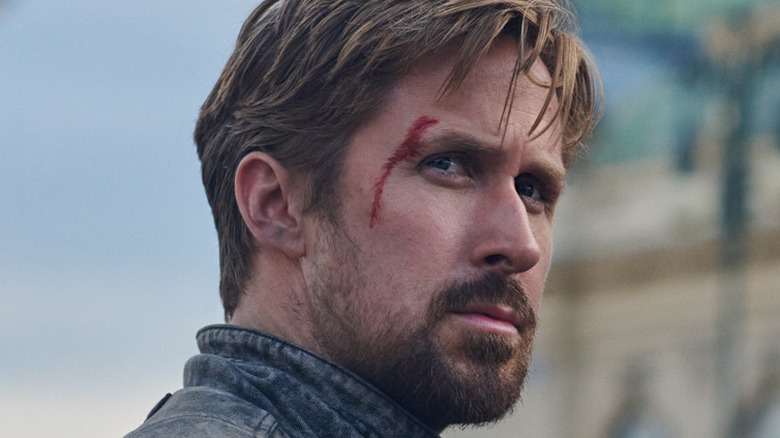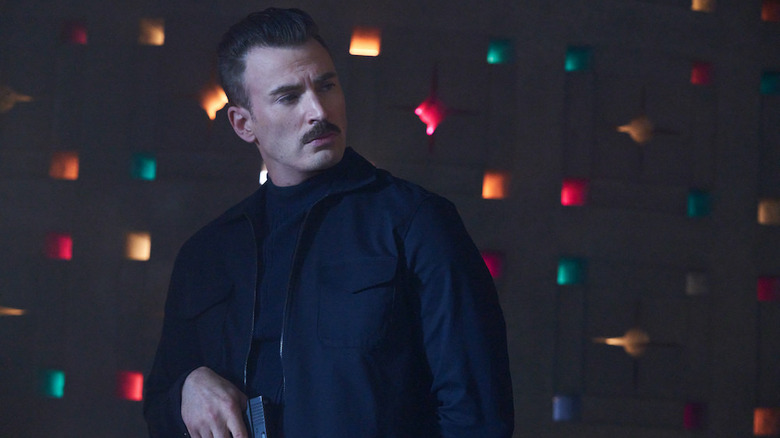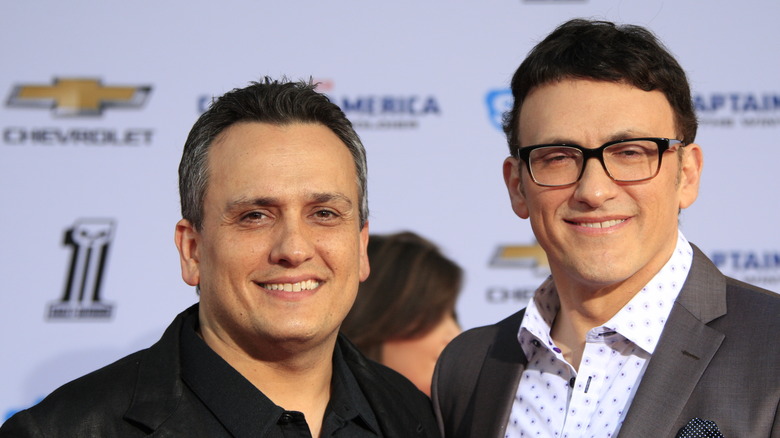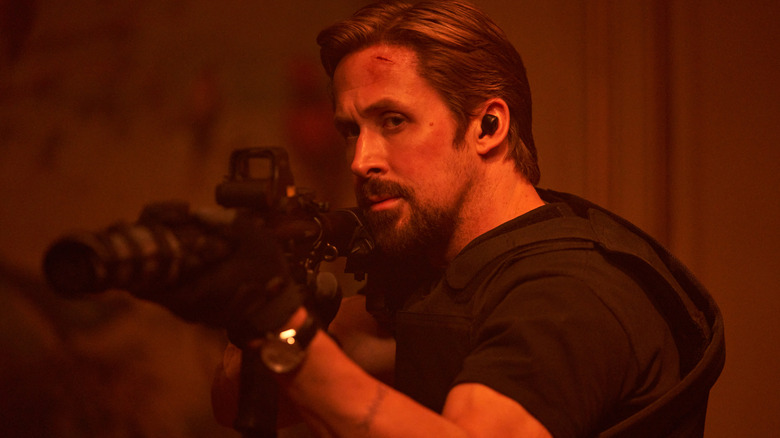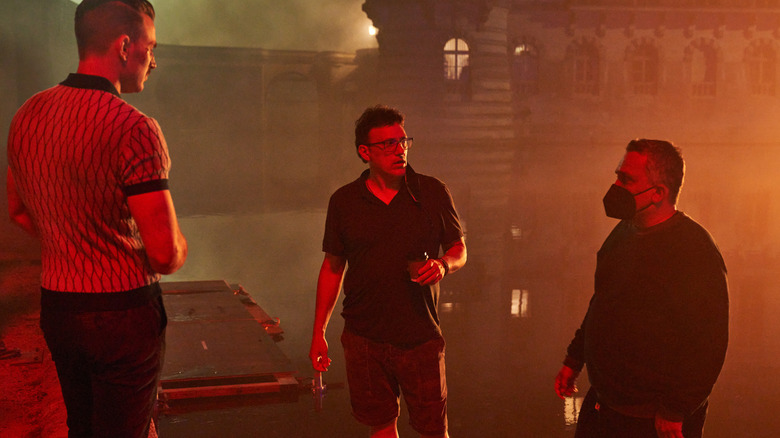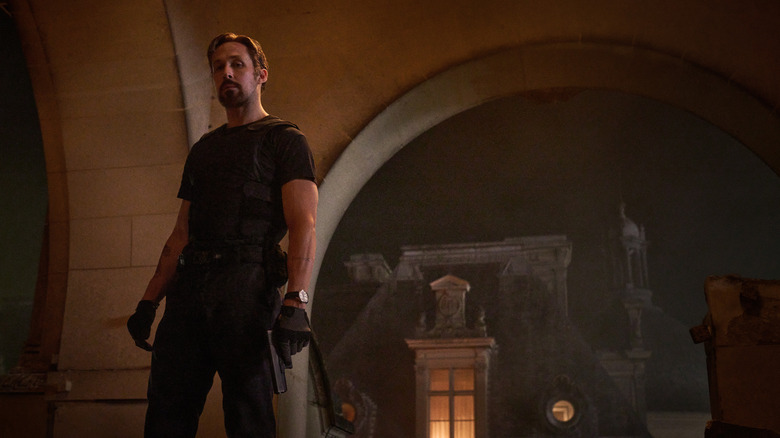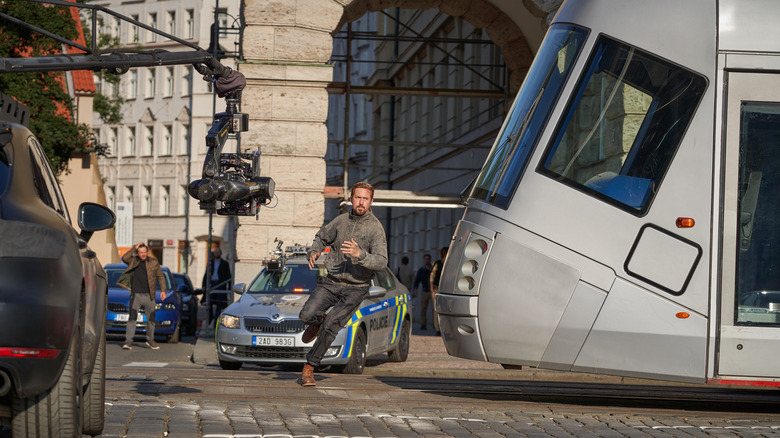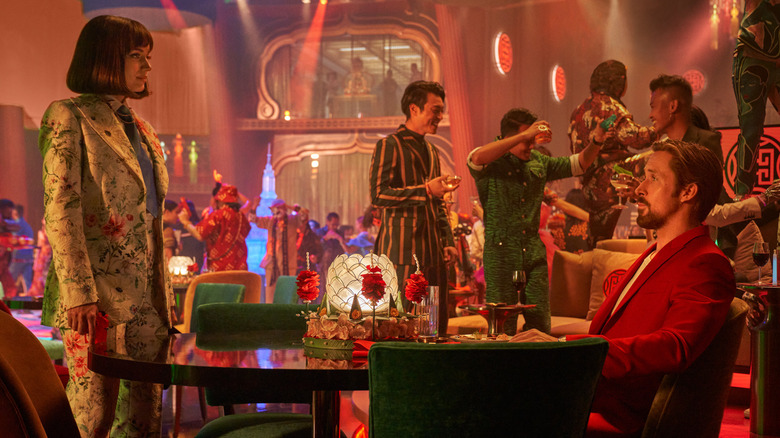Anthony And Joe Russo Bring The Gray Man Out Of The Shadows - Exclusive Interview
From Joel and Ethan Coen to Peter and Bobby Farrelly, and from Lilly and Lana Wachowski to Matt and Ross Duffer, Joe and Anthony Russo are part of the rare but accomplished history of siblings who direct movies and TV shows as a team. They also happen to be among the most successful directors working in Hollywood today, with two of the four Marvel Cinematic Universe movies they helmed, "Avengers: Infinity War" and "Avengers: Endgame," ranked among the top five highest grossing movies of all time. Not too bad for a couple of guys from Cleveland.
The pair started their career directing beloved television comedies, such as "Arrested Development" and "Community," along with occasional feature films like "Welcome to Collinwood" and "You, Me and Dupree." However, it wasn't until they were hired to direct the MCU's second Captain America-centric film, "Captain America: The Winter Soldier," that they were vaulted to widespread attention. The Russos demonstrated their ability to steer the ever-growing MCU ship three more times with "Captain America: Civil War," and the third and fourth "Avengers" films, bringing the Infinity Saga to a rousing conclusion that had both fans and critics cheering.
Today, film lovers know that a project directed by Joe and Anthony Russo means huge action, compelling characters, and a story that speaks to our current political and social times, even if it happens to involve a large group of costumed superheroes. As the brothers sit in director's chairs in their production company AGBO's screening room, they prove to be friendly, thoughtful, and enthusiastic. During their discussion of their latest film, "The Gray Man," with Looper, the Russos told us why they decided to cast Chris Evans as the story's psychopathic villain, the connection between "The Gray Man" and "The Winter Soldier," how they constructed the film's thrilling action sequences, and whether they'd return to directing comedy.
Casting Chris Evans as The Gray Man's unnerving bad guy
I have to ask, after working with Chris Evans for four movies as Captain America, what made you look at him and think he would make a great murderous psychopath in "The Gray Man"?
Joe Russo: It's really Evans who made us think that. We were working with him on "Endgame" and talking casually about where you're going to go from here, what you want to do next. He said, "I'm really blessed and fortunate in my career that I'm in a great place now and I want to take risks for the rest of my career."
We're working on this character talking about, "Wow, we really need somebody of great physical prowess and great acting ability who can play a very threatening agent of chaos." We thought, "Well, this could be perfect for Evans."
We know his range, too. We've been working with him. He's nothing like Captain America in real life. He's very energetic and charismatic and funny. He's not understated and quiet the way that Cap is. We thought, "This could be a lot of fun to let him chew the scenery and play this really colorful villain."
The ease of working with people they know
You co-wrote and produced this film with Christopher Markus and Stephen McFeeley, who were both involved with your MCU films, and for your recent film "Cherry," you worked with Tom Holland, who plays Spider-Man in the MCU. Is there a comfort in working with people that you're familiar with?
Joe: I think so. There's a shorthand, certainly, and an efficiency, but there's also a love and a fondness. We spend a lot of time together.
Anthony Russo: That's what it comes down to. When you get to spend that amount of time with people, you start to understand them on a creative level in a more sophisticated way than if you had one single experience with them. Over the years, we get to know them personally, and we also get to understand them more deeply [and] professionally.
That's what's leading to these other opportunities with them — number one, we know each other well and we like working together. We're at the point in our careers now where we're like, "We only want to work with people we really like." It's too hard to deal with the opposite.
There's that, but there's also [the fact that] we have a pretty sophisticated understanding of one another creatively, so we're able to offer one another ideas that hit close to home in terms of what we're interested in, what might excite us, [and] what are unique opportunities for one another. We read one another very well, and that's leading to a lot of the storytelling.
The Gray Man will entertain viewers and make them think
What attracted you to the story of "The Gray Man"?
Joe: We liked the book [by Mark Greaney]. It was really propulsive and inventive. It was a great read, and it felt very modern. [Anthony] and I like to infuse modern thematics into our stories. This is really a parable about good and evil. You've got two immovable objects that are on a collision course. One leans away from humanity, one leans into humanity, and there's a corrupt patriarchy at the heart of this, which feels very prevalent in our world today.
[Ryan Gosling's character Sierra] Six is a product of an abusive father and an uncaring CIA organization. There's this scary old man that's referred to who really is the essence of the corrupt patriarch in the movie who's created this cabal of Harvard intellectuals and unleashed them as a shadow government within the CIA.
It felt like a lot of things that we've been reading about and seeing, and very topical problems that are evolving in the world today and infused into a genre package in a way that you could either be consciously or subconsciously affected by the thematics. You're also going to get a big movie that is delivering you, hopefully, some brain food while it's entertaining you.
They can draw a line from The Winter Soldier to The Gray Man
In certain ways, [the clandestine government intrigue of] "The Gray Man" is reminiscent of "Captain America: The Winter Soldier," the first MCU movie you directed. Was there anything that you brought from that experience into directing this movie?
Anthony: We grew up close to the Cleveland Cinematheque. From a young age, we started watching global cinema there. It has an amazing art cinema program, [and an] amazing global cinema program. Part of the nature of Cleveland — we started in that area where Cleveland's like this mosaic of ethnicities that came from other places in the world, and we liked the idea of thinking about storytelling on a global level.
It's not, "How do you communicate with other Americans?" [But] "How do you communicate with people in Indonesia? In Ecuador?" That has always been more interesting to us on a storytelling level. When you're thinking about global storytelling and you're doing a movie that is nominally set in the political zone, you naturally start to think about that aspect of our experience.
Joe and I are very politically minded. We're very sensitive to what's happening in the world, the social-political climate in the world. When you work within the genre, it gives you an opportunity to run right at what those anxieties are. Just like when we did "Winter Soldier," we were trying to be sensitive to what were our anxieties — this is 10 years ago now — what were our anxieties about where the world was at that time? Same thing with "The Gray Man." It's like, "What are our anxieties about what's happening right now?"
Both of these movies, we tried to make very specific to the current cultural and political climate that's happening not just here in the United States, but the entire world is aware of. Those movies are connected on that level in that they're both trying to access a very similar zone of the human experience.
Their stylistic approach is dependent on the project
"The Gray Man" is very stylized, with shots set at interesting angles and unique camera set-ups. How have you worked to branch out since directing "Avengers: Endgame?" What has been your process of trying to develop a different personal style separate from the MCU?
Joe: It's really story dependent. We don't approach a project and go, "What style can we now bring to it?" We go, "What's the story and what does the story require?"
This is a propulsive, kinetic, breakneck action film. We wanted the camera work to have a certain kinetic energy to it, but also, we had some ideas about how we wanted to shoot Sierra Six, who's a Gray Man, and the intention is he's supposed to move in and out of situations without being seen. We would put him off into the roof to the right of the frame. We'd use focus sometimes to defocus him. There are some cinematic techniques that we're using that highlight the essence of who he is as a character.
The style gets informed by the mission for the movie. [For] kinetic energy, let's highlight this character who's a ghost. Or, for instance, [at the beginning of the movie] where he's targeting the guy two floors above him using the microphone, moving through the floors, to illustrate to the audience, that's how he's targeting him, by triangulating sound to find his target.
The long process of filming huge action
There are some unbelievable action sequences in this film. How do you go about composing those different scenes so they stay exciting and relevant to the story?
Joe: Painstaking.
Anthony: [It's a] really long process and part of it starts with a conception on the script level about how you're structuring a challenge or a test or an increasingly complicated set of circumstances to interfere with the lead character on the journey. After that point, we go through a long development process that involves all of our collaborators.
We have an amazing collection of collaborators, some of whom we've been working with for many years now, some of whom are newer to the table. We sit down with our stunt coordinator, our visual effects supervisor, our production designer, a lot of storyboard artists and conceptual artists that we've worked with for many years, and we all start to cook up — and eventually this even extends to the actors — but we all start to cook up: "How do we take these sequences and elevate them and drive them more at the heart of what the movie is, who the characters are, and what's happening at this specific moment in the movie? What are we actually exploring in this moment?"
And it's a long process where we go through a lot of tests. Sometimes, we will shoot a portion of the scene in a stunt gym somewhere. Almost all the time, we will go through a very elaborate version of story boarding and actual animation where it almost looks like a cartoon. We'll do cartoon versions of the scene to feel out the structure of it and the events of the sequence. It's a really long process that takes many months, many stages of revision happen.
Joe: We've said it several times: "That movie almost killed us." ["The Gray Man"] was a really hard film to make. [A] Marvel film was like four action sequences and this was nine. When we got done with four sequences, we were exhausted and realized we weren't even halfway through the movie.
It's non-stop.
Joe: It comes at you, and each one is inventive in its own way and has its own requirements. It's a very rewarding movie to make. It might be one of our favorite films because we like the tone of it. We like the fact that there's intense violence in the movie, scary characters, but then suddenly, it's very quirky and funny and emotional and it could turn on a dime on you. We feel like it's a unique interpretation of a genre movie of that scale.
They want to continue creating movies that span the emotional spectrum
Even though this is a serious story, like you mentioned, it also has bursts of humor. You have roots in comedy, directing sitcoms like "Community" and "Arrested Development." Would you ever have any interest in returning to comedy?
Anthony: For sure.
Joe: This is probably it. This is us dipping our toe back into it. It's a quirky action thriller with a very quirky lead character. Ryan [Gosling] is exceptionally funny and very dry. Evans is really highly entertaining in it. There's a sort of "Midnight Run" bickering between Ana [de Armas] and Ryan that's fun to watch. We had a lot of fun making the movie and we laugh at quite a number of things in the film that other people might not think of.
Anthony: As we've evolved as filmmakers, we really love balanced storytelling. We like movies that give you a really complete experience of all the emotions that you can go through experiencing a narrative. Sometimes, there's some stories where humor is this much of the equation [gesturing to indicate a small amount] and there's some stories where humor is this much of the equation [gesturing to indicate a large amount]. It depends on the narrative.
This interview was edited for clarity.
The Gray Man is currently playing in select theaters and will stream on Netflix beginning on July 22.
